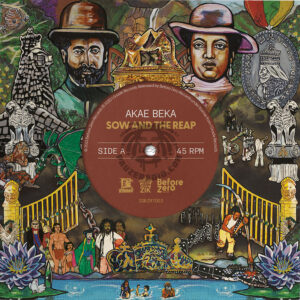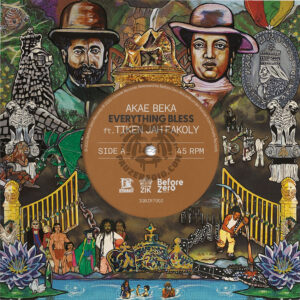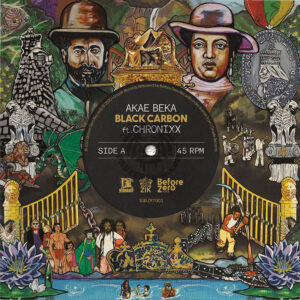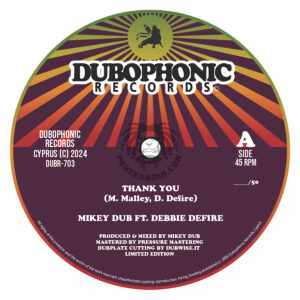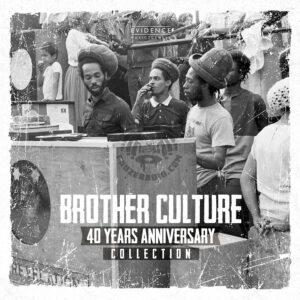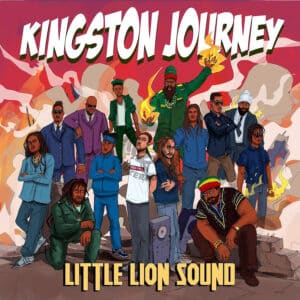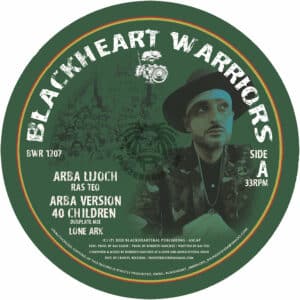
Ras Teo – Celestial Rockers – Review
Ras Teo: Celestial Rockers EP Review by Mr Topple for Pauzeradio.com.
Zion I Kings need to be set a challenge: to produce something that isn’t of the upmost quality, inspired and infinitely listenable. Because as their latest work with Ras Teo shows, doing something average is simply not in this outfit’s DNA.
Ras Teo Celestial Rockers, released via Zion High Productions, sees Teo team up for the first time with Zion I Kings. The majority of the production comes from David “JAH David” Goldfine; interestingly programmed, not live, drums were used throughout – a first for Zion I Kings. Not that this matters one iota – because as with everything they do, it’s near-perfect in every measure; the same applying to Teo. Four tracks and four dubs feature.
It should be noted that Celestial Rockers is, in Zion I Kings’ words, “Livicated To The Lyfe & Werkz of Andrew “Drew Keys” Stoch”, who passed away suddenly at the end of 2020.
The EP opens with Gone Ah Search – a swaying, rich yet brooding Roots track with clever use of a majority minor key but with occasional straying into major territory. Central to the track’s feel is Goldfine’s rhythm section. His drums perform an embellished one drop: more complex than standard fayre, the kick hits the two and four but the snare avoids them, instead doing syncopated rims clicks. The hi-hats perform a persistent double time rhythm, but with some nice semiquaver/triplet rolls and flourishes between their open and closed position. Additional percussion including reverbed blocks give a haunting feel to the line. Then, Goldfine’s bass is more authoritative. Working mainly around quavers and its own melody, it avoids Roots trappings such as arpeggio chords and picked style – opting for smoothness for much of the time. As the track progresses, he brings in dotted notation. But across the bridges Goldfine reverts to a one drop. Overall, the combination of the drums and bass creates an effective juxtaposition of momentum versus fluidity. Then, the other instrumentation accentuates this.
Keys run a bubble rhythm which stubbornly refuses to deviate from this in the main, with an electric organ providing additional interest. Laurent “Tippy I” Alfred’s rhythm guitar skanks to complement them. Then, Andrew “Moon” Bain’s guitar performs an almost secondary vocal role, winding in and out at times with some delicious, whining riffs and runs; occasionally marrying with Teo’s vocal. To finish of Gone Ah Search’s arrangement is Patrick “Aba Ariginal” Tenyue’s trumpet and Stoch’s trombone. They work in unison at times, running responses to Teo’s main calls at the end of some bars in harmony – and at others providing accompaniment to him. But towards the end, there’s a glorious solo section – soaring, full of dynamic light and shade and almost Jazz-like rhythmic variation and blue notes.
Teo himself is pitch-perfect. His performance is supremely varied between staccato notes to accentuate the lyrics, and legato structuring to complement the fluidity of the bass. The melodic arrangement is beautiful, as he works around his broad register. Teo’s vibrato is a joy, too – almost turning into semiquavers at points, showing his control over it. Lyrically, he’s delivered a potent message about not only Babylon’s false prophets but also the proponents of the system who push its toxic mechanisms. Teo also discusses broadly those who are lost and looking for their way, too – and Rastafari who are on the right path. But he also warns against those who choose fundamentalist religion over righteousness. Gone Ah Search is powerful and affecting; lush yet paradoxically stark, too. Then, the Gone Ah Selah Dub version builds on this – its use of reverb, compression, distortion and ebbing and flowing decay honing in on the unsettling elements of the original well.
Next, and Jah Waterfalls builds on Gone Ah Search – taking the flashes of fluidity further, as well as increasing the complexity of the instrumental performances juxtaposed with actually stripping the arrangement back; the brooding minor key also returns with its inflections of a major one. Goldfine’s bass is more intricate – veering between a majority one drop rhythm and beat two drop on the bridges; focusing here on more winding, dotted notation arrangement that has its own, running melody. Its style is smoother still – a contrast to the keys choppy bubble rhythm which have highly rhythmic reverb laced across them at times – and at others they fall away completely, leaving haunting breath in their place. Two guitar lines feature: Alfred’s rhythm focusing on a distant skank, again with reverb added, while Bain’s lead performs a winding, bending countermelody which sounds like it’s been slightly compressed to give a partial ‘other room’ feel.
Meanwhile, Goldfine’s drums operate an unrelenting one drop. But as with Gone Ah Search, he adds additional riffs towards the end of the bar – and the use of what sounds like a compressed vibraslap adds to the unsettling effect. Stoch’s trombone and Tenyue’s trumpet once more take centre stage – here running a more intricate arrangement, with particular attention paid to technique: contrasts of staccato and legato notes, flutter tonguing and superbly controlled crescendo and decrescendo in unison. But what makes Jah Waterfall’s so intricate is the overall composition.
The chord progressions here are fairly complex: at first working around the B flat minor root, to the minor fifth then minor sixth. But the bridge smashes these Roots norms – mixing it up with a root-major fourth-major third-minor fifth sequence. It’s glorious and shapes Jah Waterfalls into something more soulful. Then, the overall instrumental arrangement is also inspired: full of Dub breaks of varying intensity, with different instruments being stripped away across different phrases of the track to create the desired vibe. And to top it all, the focus on smoother arrangement is the perfect piece of musical mimesis to the falling top and middle of the ‘waterfall’ in the title – with certain parts like the horns’ flutter tonguing representing the rumbling chaos at the bottom. Teo himself is more pensive, here – his vocal flowing with more extensions of notes and syllables, reflecting the increase in musical fluidity. Lyrically, he’s delivered something extremely thoughtful: essentially a Song of Praise, but one that reflects the all-dominant nature of Babylon versus Jah’s, and Rastafari’s, growing anger juxtaposed with the serenity of faith and spirituality. The Digital Ancient Dub is in some respects a new piece of music, based on the basic structure of the original. Additional instrumentation and effects have been brought in – including glistening chimes (like the sun shining through the water), pattering bongos (like drips of water), synth samples and the use of reverb across Teo’s vocal. It serves as a clever building on the original.
1 n 2 n 3 takes Ras Teo Celestial Rockers’ pace up a notch while once more expanding on the overall feeling of fluidity and smoothness. The engineering and mastering seem to have been altered (lower passed) so the overall feel is richer. Once more, a minor key remains with reverb laced across many of the lines to increase the unsettling feel. The opening is genius – starting on the G flat minor 6th (as opposed to the usual root, here B flat minor) which creates the sense of something building. All the Roots rudimental elements are in place: keys across a choppy bubble rhythm which then break out into intricate glissandos and rapid part-arpeggio chords at points; Goldfine’s bass is on a more embellished riff still (a one drop on the bridges but other wise hitting every beat across a dotted, melodic sequence) and his drums on another one drop-style rhythm. There’s some glorious additional percussion in the form of blocks forthrightly tinkering at points. An electric organ also plays its part, striking vibrato’d chords on the second beat of each bar while Alfred’s rhythm guitar skanks.
Again, horns are central but on 1 n 2 n 3 playing a yet more prominent role than previously. There line is constantly on the move, running across dotted notation and at times in response to Teo’s calls. Their regal dotted semiquaver riffs chatter at times, showing the skill of Stoch’s tonguing technique on the trombone. The track’s ending is beautifully done, too – as rhythmic reverb is added across the keys, then horns, while the bass continues its incessant riff before fading into the ether. Then, Teo brings panache and a sympathetic ear to the music. His style is smooth, here, and vocal-led – focusing more on note extension and a consistently pointed delivery. Of note is his rolling back on the riffs and runs, instead honing in on cleaner notes to let the fairly complex instrumentation do the musical tricks. Lyrically, it’s a haunting piece as Teo discusses how those of us who are proponents of Babylon’s system will soon be judged, and that Jah is watching at all times to balance those scales up against us. His spoken word section across the final bridge is particularly effective and unsettling, completing this disconcerting, but still engaging, piece perfectly. Then, 1 n 2 n 3 gets a Zion High Dub. Again, it shows the skill and inventiveness of Zion I Kings, as it is different once more to its predecessors. Here, Teo’s vocal has been messed with, with sequences being copied, chopped and re-looped like reverb. The stripping away of the instrumentation is at time extremely stark – often leaving just the bass and drums exposed. Interesting engineering in the form of what sounds like compression has been laced across the horns – and overall, the dub expands on the uneasy feel and message of the original, creating something eery and nervy.
Ras Teo Celestial Rockers ends with Cooyah Cooyah. It marks a sea change in feel to the previous tracks – with the arrangements being pared back versus the intricacy of the other three tracks and a broader feeling of Dub coming to the fore. Goldfine’s bass is overly prominent here, engineered to the front and again working around a mixture of a one drop and full beat-filling; it also runs its own, almost vocal melody which runs up and down its register. Keys keep a steady bubble rhythm that is often covered in rhythmic reverb at the end of certain phrases – as is Alfred’s rhythm guitar skank. Goldfine’s main drum line once more runs around something resembling a one drop with a heavy kick on the two and four. But Cooyah Cooyah focuses more on additional percussion: pattering bongos run between both inputs, what sounds like a vibraslap shrieks in the background, Ben “Ashanti Selah” Smith’s kette add some thundering ominousness and blocks tinker, too.
Horns and Bain’s lead guitar share the centre stage as accompaniments to Teo’s vocal: the former entering with whining riffs at points, with the latter run rapid fire sequences as responses with a rich, fulsome tone. There’s a wonderful bridge which evokes Africa well: a fluttering flute appears, the horns are engineered to almost sound like an algaita or rhaita – rasping, shrill and woodwind-like and the patterning bongos (or are they djembe?) move to the fore. Then, the end almost feels like something more Hip Hop meets the Motherland, as the snare flips and strikes every beat and the vocals are turned into chants. The backing vocals from Mighty Diamonds, Paul “Lymie” Murray, Carlton “Dehdeh Blacks” Scarlett and Monique “Harmonique” Smith are extremely effective and well-delivered.
It’s all ominous but to the point – allowing Teo to shine. He is pointed and unrepentant across his performance, reverting away from the smoothness of 1 n 2 n 3, opting for sharper, punchier, clipped notes and some forthright enunciation – along with another spoken word section. He delivers a stark warning as well, as he tells Babylon’s “Wicked Man” to “look here” – delivering short shrift to those in power but also those who blindly follow, too. He offsets this with a compassionate call to people to join Rastafari – but it’s short lived. Overall, Cooyah Cooyah is highly effective – and then its I Grade Dub moves it forward further. Teo’s vocal has been rearranged again, turned into something even more forthright than the original with varying degrees of high-and-low-passing and reverb/chopping across it. The instrumentals have again been stripped away, but here there is haunting use of this as the engineering of certain lines has been elevated in terms of dB with striking reverb to give a highly unsettling feel. It’s clever and effective, and both versions of Cooyah Cooyah serves as fitting ends to the project.
Overall, Ras Teo Celestial Rockers is yet more excellent work from the collective Zion I Kings and Teo. ‘Small but perfectly formed’ is the best description – as the record has clear musical intentions, with its first building in intricacy and them the stripping away of this in its finale, and focusing on a minor key throughout. Teo displays his versatility as an artist and ability to hone in on the musical detail extremely well. He delivers stark yet thoughtful lyrics – and overall, it’s strong work; unsettling too, which is no bad thing.
Listen to Mr Topple’s radio show here: The Topple UnPauzed Show
Do you need a review or press release. Book our services for your latest release here.
Ras Teo Celestial Rockers review by Mr Topple / Pauzeradio Pr Services (1st July 2021).






